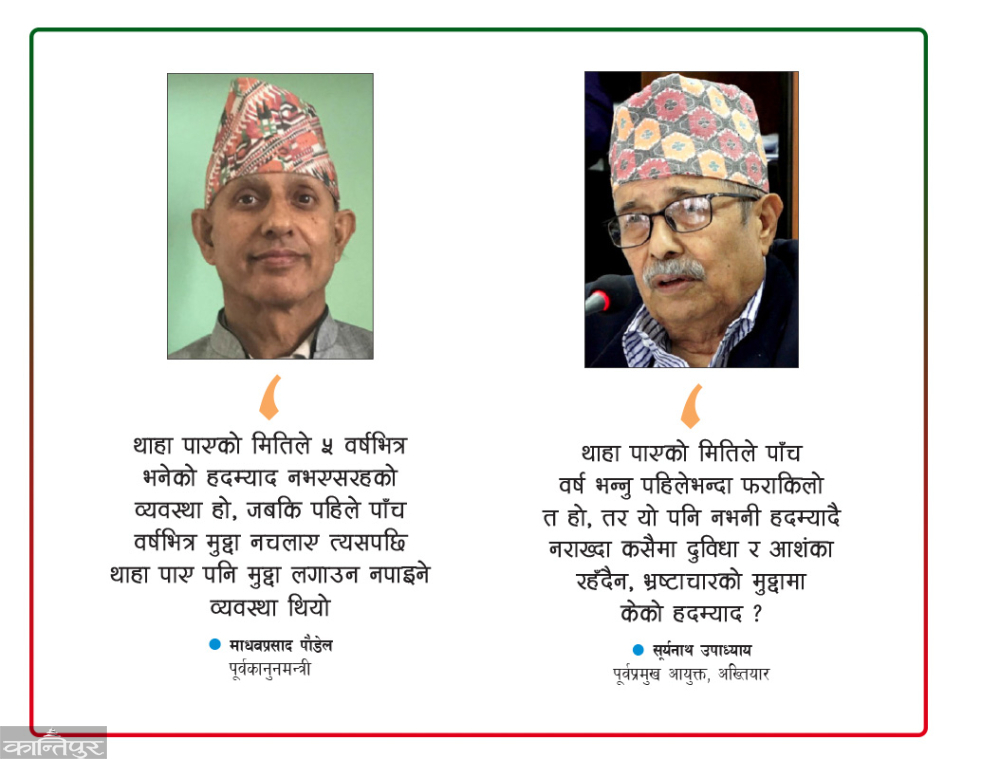Is the law being introduced to protect the corrupt?

We use Google Cloud Translation Services. Google requires we provide the following disclaimer relating to use of this service:
This service may contain translations powered by Google. Google disclaims all warranties related to the translations, expressed or implied, including any warranties of accuracy, reliability, and any implied warranties of merchantability, fitness for a particular purpose, and noninfringement.

Highlights
- While it is clearly written in the Authority Act that 'if the case is not prosecuted within 5 years of the corruption, then no action will be taken after that', in the anti-corruption bill, there is a provision that the case must be prosecuted within 5 years even if it is found out, experts claim that the proposed bill is more broad. The arrangement remains the same



Bill 2076 to amend the Prevention of Corruption Act, 2059 is currently at the center of controversy and discussion. In particular, it is being opposed as "the limit of not proceeding with the case after five years" of corruption is being opposed.

Does the proposed bill try to protect the corrupt? Is it backwards from the old law? Or what is trying to change? After the heated debate, MPs have also consulted with experts.
In particular, there is opposition to the proposed amendment of Section 45 of the Prevention of Corruption Act, 2059. The bill says in section 45 (1), "A case must be prosecuted within five years from the date of knowing that the act of corruption has been committed." However, experts are reacting by saying that the debate has turned away from the facts. As is being protested now, Section 45 of the Prevention of Corruption Act, 2059 does not have a statute of limitations in the original law.
Section 45 of the Basic Act on Prevention of Corruption says, 'When a national servant is holding a position, in connection with embezzlement or loss/damage of government or public property or the property of an institution owned by the Government of Nepal, even after such person retires from his position, a case against him Nothing written in this Act is considered to be a hindrance.' In sub-section (1) it is stipulated that 'in case of corruption offence, the case should be prosecuted within five years from the date of knowing that such act has been committed'. The protest is in this .
Similarly, it is said in sub-section (2), 'Despite what is written in sub-section (1), if any person holding a public office has committed corruption while holding such office and if such matter cannot be acted upon immediately in accordance with this Act, he Even if he retired from any profession, he will not be hindered from taking action or prosecuting him according to this Act within five years of his retirement.'' Because the officials of the constitutional bodies who can be removed only by impeachment, a provision has now been added that they can also be investigated and prosecuted. This year, the limit for prosecuting them has been fixed up to five years after their retirement, previously there was no provision to take action against them in this law.

It is also stated in sub-section (3) of the bill, 'Regardless of what is written in sub-section (1) and (2), government, community or public property or owned or controlled by Nepal government, state government or local level or public institution. In case of misappropriation of property, such a limit will not be maintained.'' Since there is no limit to it, what is the limitless corruption? "It is a case of fake certificate, misuse of authority or taking government property without harm/damage, etc.," says lawyer Ravin Sharma, who is involved in the investigation of corruption cases and its jurisprudence, "There is no limitation in cases like Lalita Niwas or Giribandhu T-Estate."
Sub-section (2) has also brought the officers of the constitutional bodies under the ambit of the law, while sub-section (3) has made it clear that there is no limit to prosecute anyone who embezzles public property. Then why is it said that according to sub-section (1) 'case must be filed within five years from the date of knowledge'? What is the effect of that? After a dispute over this issue, the State Order and Good Governance Committee of the Parliament consulted with Attorney General Ramesh Badal, former Law Minister Madhav Prasad Paudel, former Authority Chief Suryanath Upadhyay and former Auditor General Tankamani Sharma on Sunday. In the
discussion, there was a 'briefing' that there is a provision of limitation in Section 13 of the Commission for Investigation of Abuse of Authority Act, 2048 and it has been made more stringent and placed in the Prevention of Corruption Act. Sub-section 2 of Section 13 of the Abuse of Authority Investigation Commission Act has a statute of limitation to initiate a case within five years of the corruption. In this subsection, it is said, 'If the commission does not take action within five years of the act, no action will be taken under this act after that period.' Experts are of the view that it is harsh. "The five-year time limit was there before, it has been widened, but there has been opposition without studying it," former law minister Paudel told Kantipur. It has been dismissed, but now it is said that the case must be prosecuted within five years from the date of knowledge of corruption. It has become wider than before.'
Paudel says that since the 'date of knowledge' is subjective and abstract, the authorities can always prosecute the case whenever they want. 'This is a provision with no time limit, whereas there was a provision that if the case was not filed within five years, then even if it was found out, the legal limit has been widened as 'five years from the date of knowledge' is kept in the revised draft of the Anti-Corruption Act, Chairman of the Committee Ramhari. Khativada argues. "The current system is more extensive than before, because 5 years from the date of discovery means that the case can be tried at any time," he says.
Commissioner Upadhyay, the former head of the authority, has suggested that it would be better if there was no provision of time limit because of the confusion at the civil level. "Five years from the date of discovery is wider than before, but if the limit is not set without saying this, there will be no doubt and doubt in anyone," he said, "What limit should be set for the crime of corruption?" It is better not to keep it. Khatiwada, chairman of the
committee, also says that he is ready to amend the law and inform about it so that no one has any doubts about the limit. "The provision of 5 years from the date of discovery is itself more progressive than before, but the comment was prepared that the leaders did this to protect themselves," he says, "even if it is not so, if we need to make it more clear, we are also ready not to put any provision of time limit. There is no request from any party.'
 प्रकाशित : भाद्र ११, २०८१ ०५:२४
प्रकाशित : भाद्र ११, २०८१ ०५:२४

 २५.१२°C काठमाडौं
२५.१२°C काठमाडौं











